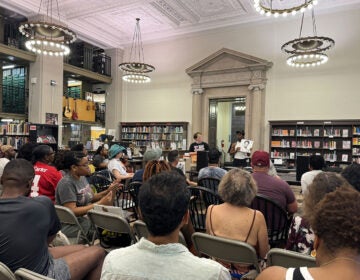Sampling a new crop of Philly artists through community support
There is a new way to buy art in Philadelphia. Two programs will allow investors to buy shares of artwork, sight unseen.
Each is modeled on farmers market CSAs, or community supported agriculture. In those arrangements, customers front a few hundred dollars to a local farmer at the beginning of the growing season. Every week, they each receive a box of produce grown on that farm.
Community supported art operates the same way; for a few hundred dollars up front, customers periodically receive a box of art created by an array of Philadelphia artists. One such program is spearheaded by the artist collectives Grizzly Grizzly and Tiger Strikes Asteroid; another is by the Philadelphia Folklore Project.
Each has selected nine artists and asked them to create 50 pieces each. For $450, Grizzly Grizzly/Tiger Strikes Asteroid will sell 50 shares of the package. The Folklore Project will charge $350.
“Understanding art, and appreciating it, is a difficult task. A lot of people are somewhat interested, and can’t devote the time to it. So they don’t get out to see as much as they could,” said Jacques Liu of Grizzy Grizzly. “A project like this allows a lot of people who might be interested to become more interested.”
The artists selected by Grizzly Grizzly/Tiger Strikes Asteroid are not members of those collectives.
Just as with the vegetable CSAs, art customers may receive something they have never seen before, don’t understand, and maybe don’t like. The challenge is dealing with it, so it becomes palatable.
“One of my favorite works like that is a piece by an artist. A series of small acorns that he had drilled, like, a million tiny holes into, and then placed all these tiny thorns,” said Laura Zabel, director of the Minneapolis-based Springboard for the Arts, which originated the idea three years ago.
“That year my mom was a CSA member, and she carried that little nut all around her house looking for the right spot for this tiny creature,” Zabel said. “It’s a piece she never would have sought out, but it’s something she fell in love with and really likes showing to people and talking about.”
When Springboard for the Arts first launched the CSA idea in the Twin Cities, it immediately sold out. Through a grant from the Knight Foundation, Zabel is seeding similar programs in other cities. Philadelphia’s Office of Arts, Culture, and the Creative Economy is assisting the effort.
Ultimately, community supported art is intended to foster relationships between artists and the people their art nourishes. Zabel says that — like farmer CSAs — it’s not just a box vegetables.
WHYY is your source for fact-based, in-depth journalism and information. As a nonprofit organization, we rely on financial support from readers like you. Please give today.




